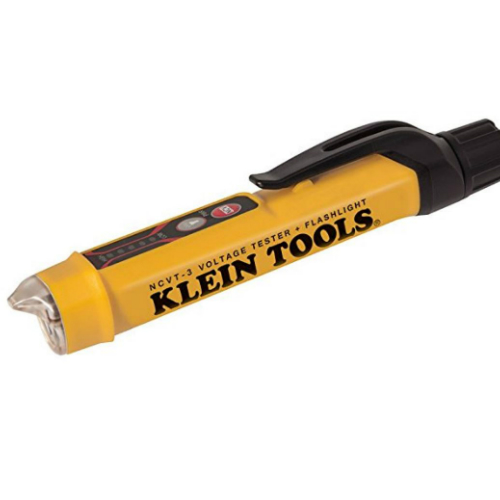6 Best Voltage Testers Reviewed & Tested
A voltage tester is an important tool for any electrician or DIY enthusiast. When you are on any electrical work, you need a quick and simple way to safely determine whether there is electric current in a wire, outlet, or electrical device. Only then can you know whether to proceed or stop the operation.
Our Top 3 Picks
[srpshortcode id=”15240″][/srpshortcode][srpshortcode id=”15239″][/srpshortcode][srpshortcode id=”15238″][/srpshortcode]
However, with the various testers in the market, how do you establish which is the best unit? Don’t be fooled by the price though. You don’t have to break your bank to acquire a premium voltage tester. That’s the purpose of this buying guide. Here, you will find details on non-contact testers, best multi-function voltage testers, best value, and the best overall voltage tester.
6 Best Voltage Testers
1. Fluke 1AC-A1-II
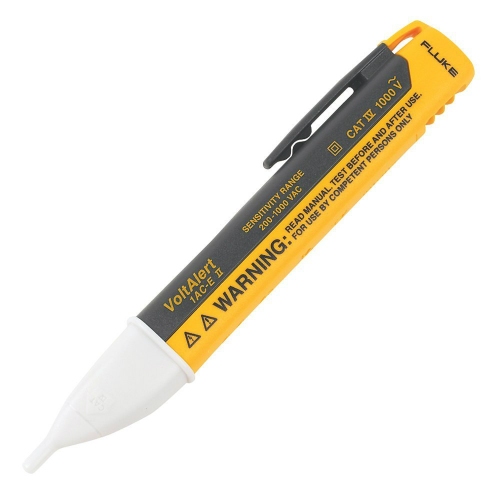
The AC-A1 II is a non-contact tester, so it is a foolproof system designed to keep you safe. It can test to detect voltages from 90 to 1000V, which is enough for most electrical applications. You press the green power button on the side and touch the tip on any surface to test for electricity. If there is voltage in a cable or outlet, the tip glows red in unison with a beep. The beep can be irritating, but you can mute it. Finally, it uses two easily replaceable AAA batteries and has a 2-year warranty
This Fluke tool is made of durable plastic that will protect the fragile components from damage. Also, it is yellow and gray and will stand out, reducing the likelihood of you losing it. The tip is a translucent plastic with LEDs that show when it's on and when there is voltage.
What Stands Out
Voltage testers will break down without warning. However, you will always know if the Fluke is working thanks to its periodic self-test, which works whenever you turn it on. It is indicated by a quick flash that is a sign that all components are in good condition and that the batteries are charged.
To save batteries, the AC-A1-II will shut down after five or so minutes of inactivity.
Product Features
• Continuous self-test and voltbeat technology
• 90V AC to 1000V AC range
• 2-year warranty
• Audible/silent
• 20 to 90V AC control circuit
Warranty
2-Year
Who is it for?
The AC-A1-II is a $30 tool for electricians and DIYers who want a tool that exclusively detects standard voltage.
- It doesn’t use that much power - pair of AAA batteries should last you more than 5 years
- Continuous beeping can be infuriating and so Fluke added two sound modes - audible and silent
- The button is in a recess, this avoids accidental engagement
- Sold with a pair of batteries
- Affordable
- It may not sense low voltages
2. Milwaukee 2203-20
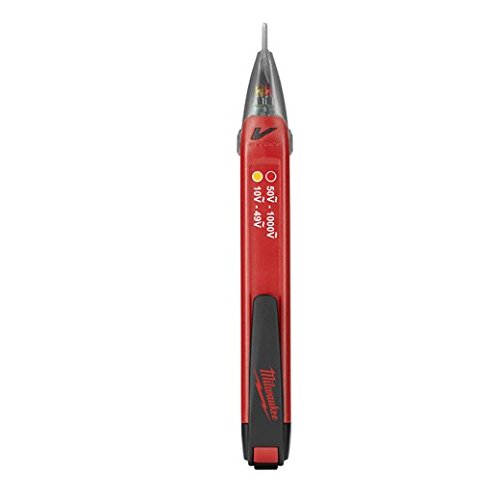
Always been at the forefront of innovation, Milwaukee has produced yet another cutting-edge product to help solve everyday problems with the 2203-20 voltage tester. This dual-range tester can identify voltages between 10 and 1000v, something few testers on the market can do.
It also has automatic shutdown after 5 minutes.
What Stands Out
Other companies have tried unsuccessfully to make dual-range detectors, but they have fallen short. The Milwaukee 2203-20 will automatically detect and differentiate between low to standard voltages, so you don't have to.
This tool has a green power-on light, plus an audible beep. When detecting low voltage, the tip will blink a bright yellow with a beep in unison with the light. When detecting a standard voltage, the light blinks a bright red, with a continuous tone. An LED light serves as a flashlight in a dark workspace, making it two tools in one.
• Dual range tester – It can automatically detect low and standard voltages
• Different colored indicator lights
• Powered by two AAA batteries
• Pocket clip
• Lightweight at 2.4 ounces
Warranty
1-Year
Who is it for?
If you are in the market for a tool to specifically check the voltage, then this is the item for you. Also, if you are working in a loud environment, you will appreciate the tones that accompany the lights.
- The pen-like design makes it easier to use
- The LED flashlight is handy in dark workspaces
- The automatic shut down will help save your batteries
- Continuous beeping
1. Fluke 1AC-A1-II

The AC-A1 II is a non-contact tester, so it is a foolproof system designed to keep you safe. It can test to detect voltages from 90 to 1000V, which is enough for most electrical applications. You press the green power button on the side and touch the tip on any surface to test for electricity. If there is voltage in a cable or outlet, the tip glows red in unison with a beep. The beep can be irritating, but you can mute it. Finally, it uses two easily replaceable AAA batteries and has a 2-year warranty
This Fluke tool is made of durable plastic that will protect the fragile components from damage. Also, it is yellow and gray and will stand out, reducing the likelihood of you losing it. The tip is a translucent plastic with LEDs that show when it's on and when there is voltage.
What Stands Out
Voltage testers will break down without warning. However, you will always know if the Fluke is working thanks to its periodic self-test, which works whenever you turn it on. It is indicated by a quick flash that is a sign that all components are in good condition and that the batteries are charged.
To save batteries, the AC-A1-II will shut down after five or so minutes of inactivity.
Product Features
• Continuous self-test and voltbeat technology
• 90V AC to 1000V AC range
• 2-year warranty
• Audible/silent
• 20 to 90V AC control circuit
Warranty
2-Year
Who is it for?
The AC-A1-II is a $30 tool for electricians and DIYers who want a tool that exclusively detects standard voltage.
- It doesn’t use that much power - pair of AAA batteries should last you more than 5 years
- Continuous beeping can be infuriating and so Fluke added two sound modes - audible and silent
- The button is in a recess, this avoids accidental engagement
- Sold with a pair of batteries
- Affordable
- It may not sense low voltages
5. AstroAI Digital Tester
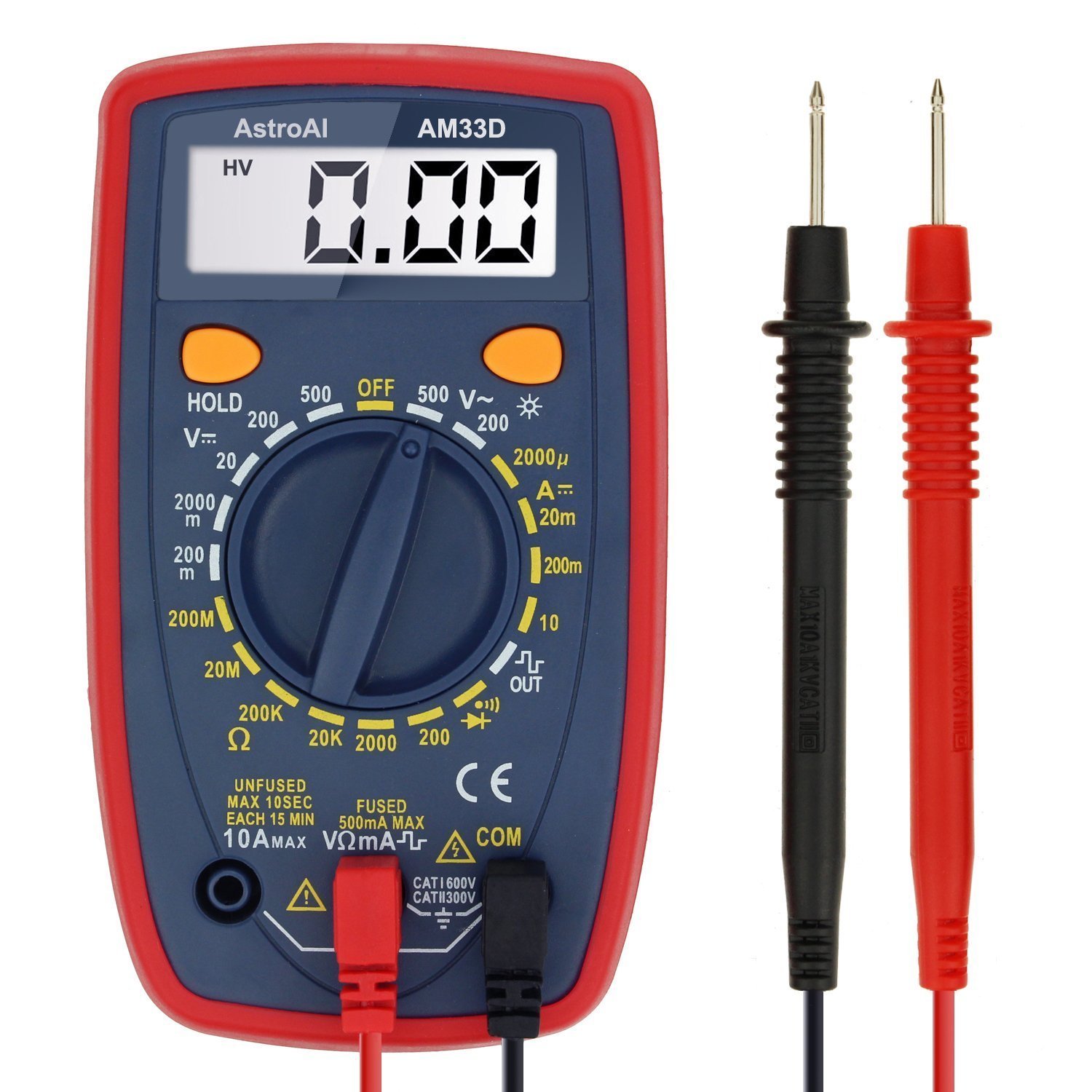
The meter measures 5.1" x 2.8" x 1.4" and feels comfortable in the hand. The AstroAI has a back-lit display which makes it easy to read in dim light, along with a kickstand for conveniently working on a bench and a lo9w battery indicator. The case is plastic, but it has rubber corners to protect it if you drop it.
What Stands Out
When you get a reading, you hold the data until you record it by pressing a button. The data hold function only records one rating, but your data does not disappear until you go to your next measurement.
Customer service is awesome. Even though this meter is inexpensive, the company even reached out to people who complained of problems in reviews and often sent another unit to resolve the problem.
The AstroAl has anti-burn and dual fuse protection that provide overload protection for safety.
Product Features
• A back-lit display that makes it easy to read in dark workspaces
• A kick in stand
• 2 times per second sampling speed
• Can test both AC and DC
• 1-year warranty
• Data hold function
• Weight: 8.8 ounces
• Dimensions: 5.1" x 2.8" x 1.4"
Warranty
1-Year
Who is it for?
For all its functionality, the AstraAl sells for about $14 on Amazon, making it less than half the cost of basic pen testers. It is a bit too big for a pocket, but its functionality makes it essential for any DIYer.
Has a large display that makes working in dark areas a breeze, and a kick in stand for horizontal surfaces
Includes a 9-V battery
Compact, making it easy to fit in an electrician’s toolbox
Responsive customer service
It isn’t the most durable
6. Neoteck Pocket Tester
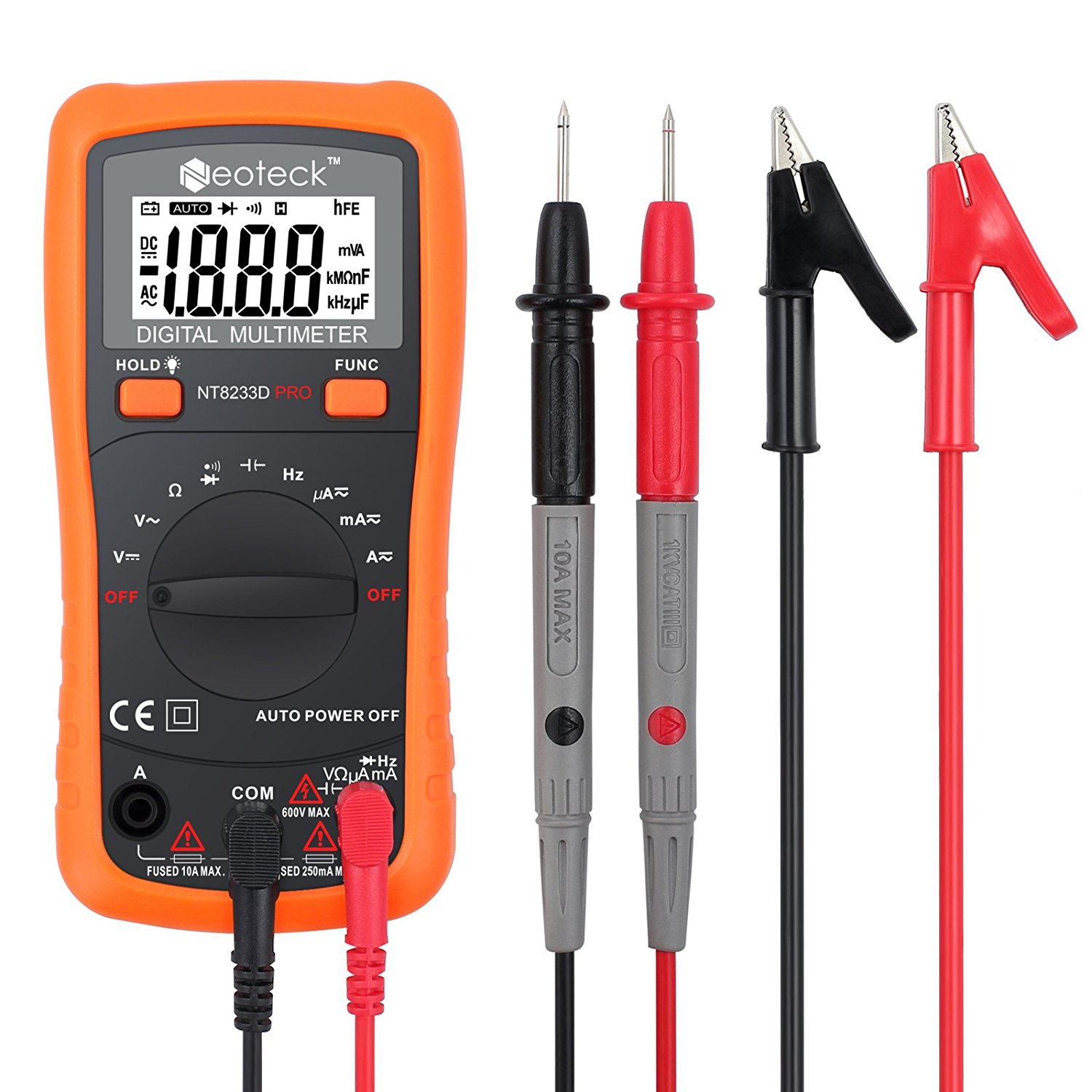
Measuring 14.4" x 7" x 3.7", the Neotech has a plastic case encased in a rubber outer case, reminiscent of a shockproof cell phone case, which protects the meter if dropped, and a handy built-in stand. It has a large back-lit LCD screen and auto-ranging plus overload protection. The Neoteck also features overload protection, automatic shutoffs, and double current fuses. It also meets the IEC 61010 and-CAT II 600v requirements plus has double insulation
What Stands Out
The Neoteck has multi-function capabilities for checking AC and DC current, continuity, diode, resistance, and more. Equipped with auto-ranging, it will select the appropriate range for your test. The readings on this tool are quite accurate too. Several reviewers who do professional testing were impressed with the accuracy as compared to what equipment on the job could do
Some complained that the meter did not measure a particular quality, but when this problem was mentioned to customer service, the company was very quick to replace the device. Finally, it has an 18-month warranty.
Product Features
• Large back-lit LCD display
• Multi-function tester to test continuity, AC and DC voltage current, continuity, etc.
• Overload protection
• Data hold function
• Includes a 9V volt battery
Warranty
18 months
Who is it for?
This $23 device is useful for both DIYers and experienced professionals.
- It is sturdy and well built given the price point
- Performs very well and gives accurate readings
- Excellent cutomer service
- Not all readings are accurate
What to Consider when Purchasing a Voltage Tester
Capabilities
Before you acquire a voltage tester, be clear what you are going to use it for. For checking just the polarity and voltage, a non-contact tester is sufficient, while checking the resistance, current, continuity, etc., requires a multi-function tester.
Configuration and Ease of Use
Voltage testers are available in various sizes and styles. The three most popular types are pen-style, outlet testers, and multi-testers or multimeters.
Most non-contact testers are pen-style, so they can conveniently fit in your pocket and are easy to carry around.
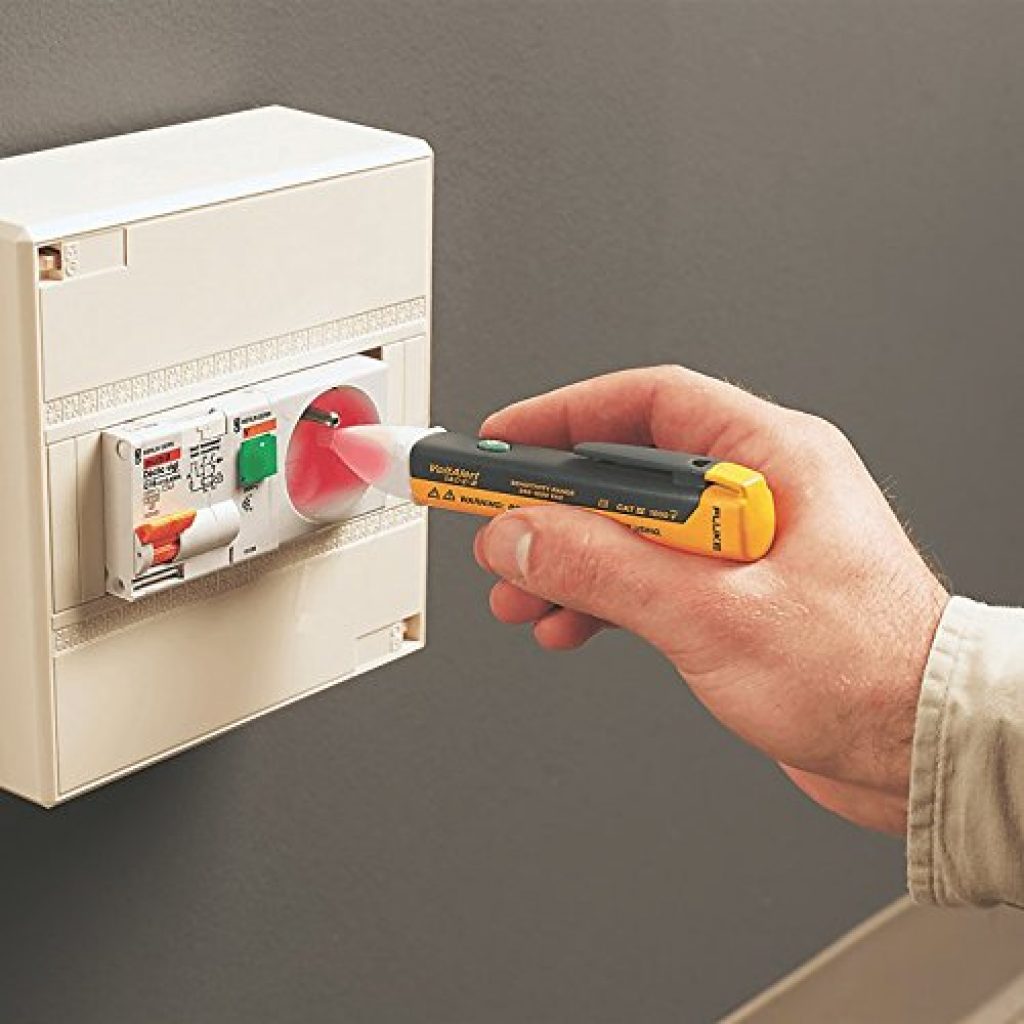
Outlet testers are a second type of voltage tester that tests for voltage and polarity of an outlet to make sure the outlet is wired correctly. They plug into an outlet for testing but are not able to test other circuits. Like pen testers, outlet testers are most effective for testing switches, outlets, and fixtures. Both types might have extra features such as flashlights, measuring lasers, and infrared thermometers
Multi-testers or multimeters can measure multiple electrical properties; when they measure voltage, resistance, and current, they are also called volt-ohm-milliammeters (VOMs.) If you are testing or repairing computers, drones, or televisions, a multimeter is what you would need. There are many types of multi-tester.
Most current models display their results digitally and have built-in accessories such as flashlights or LED lights to illuminate a work area, a wire support to hold the tester to keep the hands free, and a data-hold button to record readings.
Safety
When working with electric current, you want to be safe. Most products for voltage testing are insulated to protect electricity from transferring to you. Voltage testers tell if current is running to an outlet or device; once you have tested for the presence of power, you should turn off the breaker or disconnect devices before doing any repairs.
The best voltage testers have overload protection, as well as protective cases to prevent shock or breakage when dropped.
Longevity
How long will a voltage tester serve you? As you are looking for a tool that will be part of your toolkit for years to come, buy one from a trusted manufacturer.
To make sure the voltage tester is ready to go, it needs battery power. Check for a model that has an automatic shut off to protect the battery if you aren’t using for 15 minutes or so.
Price
Stay within your budget. However, as the functionalities in a voltage tester increase, so does the price. All of the best voltage tested in our buying guide are reasonably priced.
FAQs
1. Which is the best unit for both industrial and ordinary building installation?
Most professionals will use different tools to conduct the main tests. However, a multi-function voltage tester can conduct most tests in ordinary houses and industrial setups.
2. How do I know if the tester is functioning?

Voltage testers fail. They will depreciate over time and then stop working. Being able to identify if the tool is operational can save you time, and a number of inconveniences. Some non-contact options conduct self-tests that let you know if they are operational or not. For those that don’t, use good habits like using it on a known live wire to tell if it’s working or not.
3. How does a non-contact voltage tester work?
A non-contact device works by detecting electromagnetic fields in a conductor. Alternating current (AC) induces electromagnetic fields in a conductor, and a non-contact device will respond thanks to the field strength of the field, and thus the higher the voltage, the stronger the field. It is for this reason that non-contact testers cannot be used to test DC current as it does not produce electromagnetic fields.
4. How does a voltage tester differ from a multi-meter?
Voltage testers indicate only the presence of voltage. Multimeters can test the amount of voltage, amperage, or resistance in a fixture or circuit. Some multimeters feature voltage testers, bit voltage testers and multimeters are not the same.
5. How do I maintain a multimeter?
First, do not connect to more than 1000V alternating current or 700V direct current. Also, do not arbitrarily replace the line.
Conclusion
A voltage tester is an indispensable tool, as any professional will confirm. It helps you establish the voltage in a device, outlet, or cable so you know the next step in repair. Our reviews of the best voltage tests can help you pick the best one for your needs.

